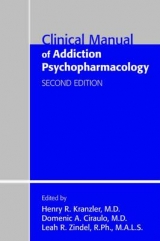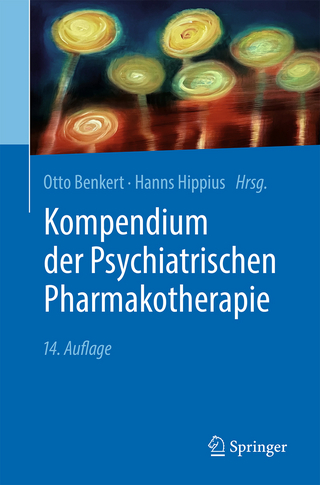
Clinical Manual of Addiction Psychopharmacology
Seiten
2005
American Psychiatric Press Inc. (Verlag)
978-1-58562-132-3 (ISBN)
American Psychiatric Press Inc. (Verlag)
978-1-58562-132-3 (ISBN)
- Titel erscheint in neuer Auflage
- Artikel merken
Zu diesem Artikel existiert eine Nachauflage
Offers in-depth background discussion on each major class of drug and its treatment. The exciting discoveries of the neuropharmacology and psychopharmacology of addictive disorders make this book an essential guide to our understanding of this challenging field. It is for all clinicians, psychiatric educators, and mental health practitioners.
RecentAand excitingAdiscoveries of the neuropharmacology and psychopharmacology of addictive disorders make the Clinical Manual of Addiction Psychopharmacology an essential guide to our understanding of this exceptionally challenging field. Written with a therapeutic focus as a clinical guide for the use of pharmacotherapy in patients with substance use disorders, the Clinical Manual of Addiction Psychopharmacology offers -In-depth background discussion on each major class of drug and its treatment. -Meticulously detailed reviews of the pharmacology of addictive drugs and the medications used to treat dependence on these addictive drugs. -The latest work of 24 recognized experts from both the United States and abroadAall contributors to the empirical literature covered here. -Nine chapters, highlighted by informative illustrations, covering all of the major classes of substances that are clinically important in relation to addiction: alcohol, opioids, sedative-hypnotics, cannabis, cocaine and psychostimulants, hallucinogens and phencyclidine, club drugs (gamma-hydroxybutyrate, ecstasy, and ketamine), inhalants, and tobacco.
-A discussion of psychosocial treatments combined with pharmacotherapy for alcohol, cocaine, and opioid use disorders. The goal of this approach is to optimize outcomes by understanding how patient characteristics, such as substance use disorder typology, severity, family history, and comorbid psychopathology, may interact with psychosocial and pharmacological treatment. Each chapter covers three primary aspects of a major drug group: an overview of the clinical pharmacology of the abused substance, phenomenology or pharmacological treatment or both of the abstinence syndrome, and pharmacological treatment for relapse prevention. For disorders in which no clear pharmacotherapy has proven effective (e.g., cocaine dependence), or for disorders in which no clear abstinence syndrome has been established (e.g., marijuana dependence), authors review the basic pharmacology of the drug and the phenomenology of withdrawal to enable clinicians to evaluate new clinical research in medications development for those disorders.
An essential guide for clinical and social work, the Clinical Manual of Addiction Psychopharmacology will find a wide audience among all prescribing clinicians, psychiatric educators and their students, and other mental health practitioners.
RecentAand excitingAdiscoveries of the neuropharmacology and psychopharmacology of addictive disorders make the Clinical Manual of Addiction Psychopharmacology an essential guide to our understanding of this exceptionally challenging field. Written with a therapeutic focus as a clinical guide for the use of pharmacotherapy in patients with substance use disorders, the Clinical Manual of Addiction Psychopharmacology offers -In-depth background discussion on each major class of drug and its treatment. -Meticulously detailed reviews of the pharmacology of addictive drugs and the medications used to treat dependence on these addictive drugs. -The latest work of 24 recognized experts from both the United States and abroadAall contributors to the empirical literature covered here. -Nine chapters, highlighted by informative illustrations, covering all of the major classes of substances that are clinically important in relation to addiction: alcohol, opioids, sedative-hypnotics, cannabis, cocaine and psychostimulants, hallucinogens and phencyclidine, club drugs (gamma-hydroxybutyrate, ecstasy, and ketamine), inhalants, and tobacco.
-A discussion of psychosocial treatments combined with pharmacotherapy for alcohol, cocaine, and opioid use disorders. The goal of this approach is to optimize outcomes by understanding how patient characteristics, such as substance use disorder typology, severity, family history, and comorbid psychopathology, may interact with psychosocial and pharmacological treatment. Each chapter covers three primary aspects of a major drug group: an overview of the clinical pharmacology of the abused substance, phenomenology or pharmacological treatment or both of the abstinence syndrome, and pharmacological treatment for relapse prevention. For disorders in which no clear pharmacotherapy has proven effective (e.g., cocaine dependence), or for disorders in which no clear abstinence syndrome has been established (e.g., marijuana dependence), authors review the basic pharmacology of the drug and the phenomenology of withdrawal to enable clinicians to evaluate new clinical research in medications development for those disorders.
An essential guide for clinical and social work, the Clinical Manual of Addiction Psychopharmacology will find a wide audience among all prescribing clinicians, psychiatric educators and their students, and other mental health practitioners.
Henry R. Kranzler, M.D., is Professor of Psychiatry, Associate Scientific Director of the Alcohol Research Center, and Assistant Dean for Clinical Research at the University of Connecticut School of Medicine in Farmington, Connecticut. Domenic A. Ciraulo, M.D., is Psychiatrist-in-Chief, Boston Medical Center, and Professor and Chairman, Division of Psychiatry, Boston University School of Medicine in Boston, Massachusetts.
Alcohol. Opioids. Sedative-Hypnotics. Cannabis. Cocaine and psychostimulants. Hallucinogens and phencyclidine. Club drugs. Inhalants. Tobacco. Psychotherapy and pharmacotherapy in treatment of substance use disorders. Index.
| Erscheint lt. Verlag | 18.7.2005 |
|---|---|
| Verlagsort | VA |
| Sprache | englisch |
| Maße | 140 x 210 mm |
| Themenwelt | Medizin / Pharmazie ► Medizinische Fachgebiete ► Pharmakologie / Pharmakotherapie |
| Medizin / Pharmazie ► Medizinische Fachgebiete ► Suchtkrankheiten | |
| ISBN-10 | 1-58562-132-3 / 1585621323 |
| ISBN-13 | 978-1-58562-132-3 / 9781585621323 |
| Zustand | Neuware |
| Informationen gemäß Produktsicherheitsverordnung (GPSR) | |
| Haben Sie eine Frage zum Produkt? |
Mehr entdecken
aus dem Bereich
aus dem Bereich
Arzneimittelverzeichnis für Deutschland (einschließlich …
Buch | Hardcover (2024)
Rote Liste Service GmbH (Verlag)
109,00 €



